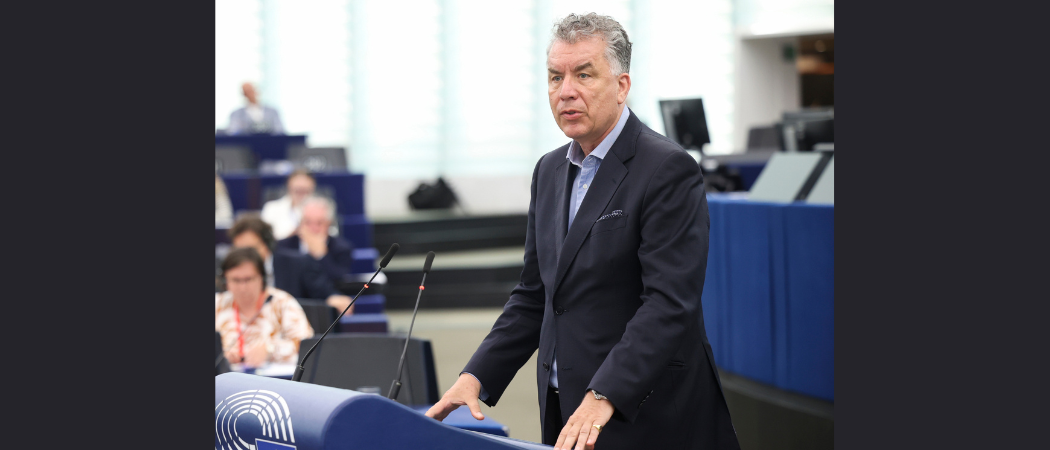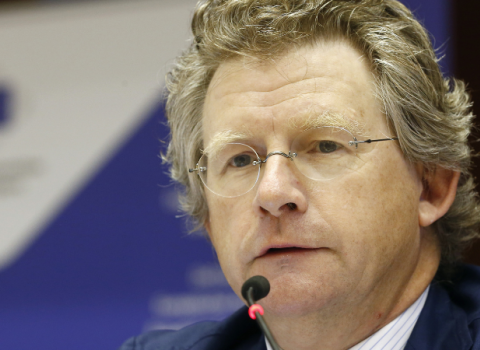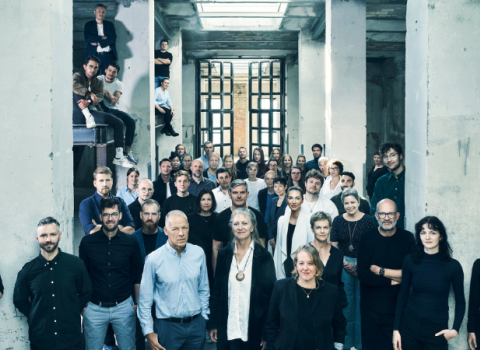The EU’s €10B innovation fund has been riddled with problems since launching in 2021. Christian Ehler MEP says it’s too early to say it doesn’t work - but without more independence from the Commission, the EIC won’t fulfil its mission

Christian Ehler MEP. Photo: Alexis Haulot / European Union
The European Innovation Council (EIC) should be given more independence from the European Commission and the freedom to make bigger investments in start-ups, according to Christian Ehler MEP.
More autonomy would free EIC from the cross hairs of internal Commission politics, giving it more flexibility to act as the tech investment fund it was envisioned to be. “I think what we should encourage is a certain level of independence of the EIC agency,” says Ehler. “Because I think that neither the European Investment Bank, nor the Commission have the reputation on the market for having a venture capital fund mindset,” he told Science|Business.
EIC was set up in 2021 under the €95.5 billion Horizon Europe research programme, as the EU’s latest attempt to plug the funding gap for early stage companies. The €10 billion budget is meant to enable companies to develop their technologies to the point where they can attract venture capital.
It has been a rocky start. After naming the first awardees in 2021, the Commission ran into problems carrying out due diligence on start-ups and managing the risks involved in running its own equity fund. It simply did not have the capabilities in house to deliver the combination of grants and equity investments that the EIC promised in its €7 billion Accelerator programme for start-ups.
The fund didn’t get the money out and until recently very few euros had been invested. Ehler says that by March this year as little as around €50 million had been put to work.
At issue was the EIC’s more relaxed attitude to risk running up against the Commission’s institutional rigidity, according to Ehler. In particular, the Commission’s budget directorate raised an alarm over the reputational risk of investing directly in start-ups.
To circumvent this, the reins of the fund were handed over to the European Investment Bank and an external fund manager, Alter Domus. The new management is working in practice, but the full conditions are still being negotiated.
Ehler, who represented the European Parliament in setting up the EIC, says the clash was to be expected because the EIC goes against the very nature of the Commission’s mindset. This has now turned into one of the biggest challenges for the future of the fund, he said. “These institutional reflexes - to secure, to integrate, to reduce risk, to control - is somehow permanently challenging the development process of the EIC towards a final construction.”
Hiccups along the road
Despite his reservations, Ehler acknowledges that with the external fund manager in place, the situation is improving. Investments are being processed faster and interest in the fund is huge, with demand far exceeding the fund’s limits.
But the tension between the Commission and the fund remains, with new problems springing up. Most recently, the EIC Accelerator’s online submission platform was abruptly shut down with no prior notice to applicants and just two weeks ahead of a big deadline.
The Commission’s official statement blamed the move on a “contractual dispute” with the provider, a French start-up The Innovation Loop. The platform had issues from the start, yet some Commission insiders say – and Ehler subscribes to this explanation – internal politics were to blame for the sudden shut down, with the teething troubles providing an excuse for those didn’t like the idea of an external company running the system.
Ehler sees the recent fallout over the platform as another sign that the EIC is a work in progress and subject to a permanent internal fight. “It hasn’t been the game changer that was announced, and the problem is, so far, all these hiccups,” he tells Science|Business.
Fighting for a future
Despite these setbacks and the ongoing tensions, Ehler believes the vision is right and the EIC is Europe’s best hope of filling the investment gap, which is vital if the EU wants to lead the world in clean technology. “In a phase of transition, as we are transforming our economies, the financing of innovation becomes more and more important,” he says.
This mirrors the Commission’s vision. In the recent mid-term review of the EU’s seven-year budget, the Commission proposed handing the EIC Accelerator a €2.6 billion top-up as part of the new Strategic Technologies for Europe Platform (STEP), and to increase the maximum investment it could make in an individual company from a maximum of €15 million to €50 million.
Ehler, who is the Parliament’s rapporteur for STEP, supports the proposal but doubts the member states will be as keen on giving extra money to the EIC. The full top-up foresees €500 million in ‘fresh’ money and for €2.13 billion to be diverted from elsewhere in Horizon Europe and from unused research funds. This won’t be an easy sell to EU governments.
And the EIC may be facing a bigger existential problem in the Horizon Europe mid-term review and the subsequent formulation of the successor programme to Horizon Europe, for which the Commission is currently laying the ground. The Commission doesn’t tend to be overly critical of its own work, but given the early stumbling blocks, the EIC hasn’t had the time to prove itself. To keep going and growing under the next EU research programme, it needs a good grade and to convince the member states of its worth.
But the EIC wasn’t that popular with research ministers from the very beginning, because it diverts money from research into innovation. “This tendency to shift from research to instruments like that is seen by the Council as very problematic,” Ehler says.
The fund was championed by EU heads of state, and especially France’s Emmanuel Macron, but its future is in the hands of research ministers who are less keen on funding non-traditional research programmes. Ehler expects the talks on the EIC’s future to be tough.
Another factor playing against the EIC is the current lack of a research innovation commissioner to fight its corner, with Mariya Gabriel’s replacement Iliana Ivanova not expected to take up the post until September.
As new priorities take centre stage in the lead up to the negotiations over the next research framework, which is due to start in 2028, the EIC has to prove its worth. “If we don't end all these hiccups and inter-institutional fights, the question is whether we give them an additional €2.6 billion,” says Ehler.
“I think it's too early simply to say it doesn't work. We desperately need it, in a way. But I think it's the biggest challenge for the new commissioner [between now and] the end of the term.”





 A unique international forum for public research organisations and companies to connect their external engagement with strategic interests around their R&D system.
A unique international forum for public research organisations and companies to connect their external engagement with strategic interests around their R&D system.